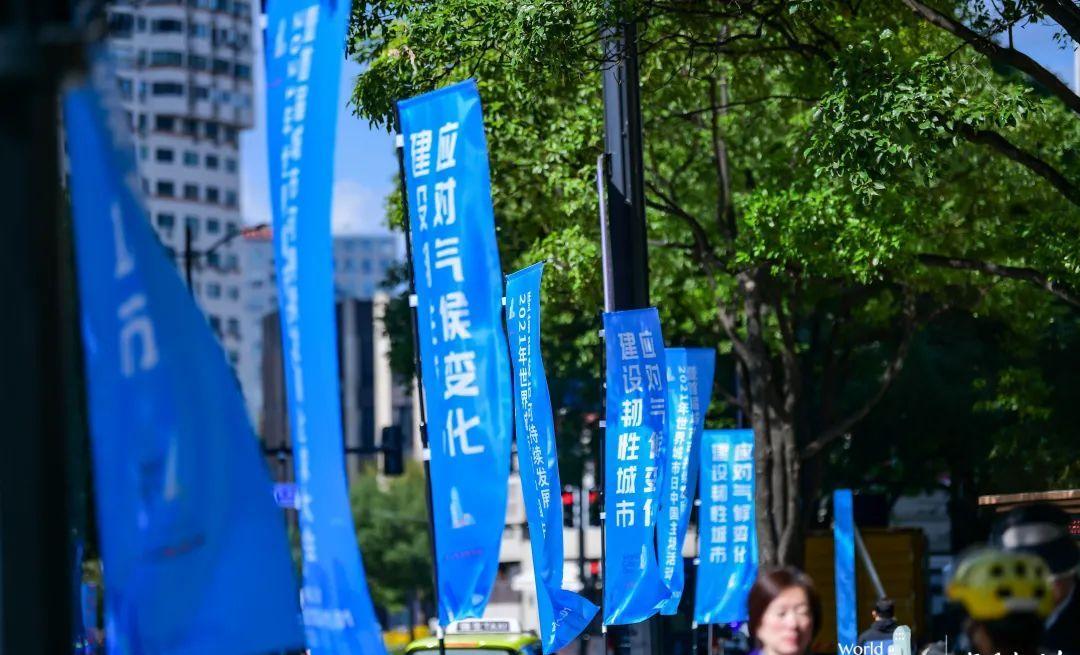On the morning of October 31, the 2021 World Cities Day China Main Event and the First Global Conference on Urban Sustainable Development in China were successfully held in Shanghai. With the theme of urban renewal and green community creation under the background of "double carbon", the forum adopted a combination of online and offline methods, focused on urban transformation and upgrading and green high-quality development, and introduced China's urban renewal, urban physical examination, human settlement environment quality improvement and green community innovation models and excellent experiences to the world.

At the forum, Li Zhe, second-level inspector of the Department of Planning, Finance and Foreign Affairs of the Ministry of Housing and Urban-Rural Development, Zhu Jianhao, deputy director of the Shanghai Municipal Housing and Urban-Rural Development Administration Committee, and Yang Haiying, president of China Construction Newspaper, delivered speeches. Leading experts and enterprise representatives from the industry delivered speeches around the theme, sharing innovative practices and exploration solutions in their respective fields in the field of high-quality urban development.
In the second half of urbanization, the implementation of urban renewal actions is the main work of urban planning and construction management. Wang Kai, president of the China Academy of Urban Planning and Design, said that under the "double carbon" goal, urban renewal actions should take intensive connotation, green and low-carbon as the development path, strictly control large-scale demolition, large-scale construction, large-scale relocation, pay attention to quality, protect history and culture, and achieve high-quality development. It is necessary to build an urban pattern that gives priority to ecology, pay attention to the function of ecological culture, and promote the construction of green and low-carbon communities.
Sun Ying, deputy secretary of the party committee and president of China Construction Technology Group, focused on the scientific path and transformation direction of the industry to achieve the "double carbon" goal. When she participated in the online meeting, she said that to achieve green and low-carbon in the field of construction in China, we must comprehensively implement policies from the perspective of the whole life cycle and go out of our own way: extend the life of buildings and minimize the use of building materials; pay attention to space energy conservation, that is, pay attention to natural lighting and natural ventilation; pay attention to the application of renewable energy; and also pay attention to prefabricated decoration. In short, comprehensive measures are needed, and it is by no means "one trick" that can solve the problem.
Where there is a dream, there is a future. Sun Shihui, secretary of the party group and director of the Jinan City Chengguan Bureau in Shandong Province, started from his "Dream of Quancheng" and shared their unremitting efforts to "realize the dream": establish the concept of "big city management" to build an urban governance community, establish the concept of "urban aesthetics" to improve the quality of the city, establish the concept of "waste-free city" to promote the sustainable development of circular economy, establish the concept of "smart urban management" to empower the innovation and transformation of urban management, and establish the concept of "urban management for the whole people" to promote the integration of urban management and social governance.
In addition, as representatives of brand enterprises, Fang Mingfu, vice president of Jinke Group and president of Jinke Innovation Research Institute, and Tang Fen, director and president of Changsha Yuanda Housing Industry Group Co., Ltd., provided typical cases of enterprises assuming social responsibility through scientific and technological innovation for this forum, and contributed practical experience to the high-quality development of the industry.
Fang Mingfu believes that the future building is not an innovation of the façade or a certain technical point, but a systematic innovation, an innovation from the surface and the inside, from the point to the surface, and the future building should be an organically coordinated life.
Tang Fen shared his thoughts on the future development of the construction industry by sharing the "growth history" of Changsha Yuanda Housing Industry Group Co., Ltd. She believes that in order to achieve the "double carbon" goal of the construction industry, industrialization must be the best technical way.
In the context of carbon peaking and carbon neutrality, the importance of urban renewal and the creation of green communities has become more prominent. In order to bring together the strength of all parties, the forum also set up a special discussion session with the theme of "Urban Quality Improvement and Green Development", and the speakers, as well as Su Youtuo, chief economist of the Department of Housing and Urban-Rural Development of Fujian Province, Li Rilong, chief economist of the Department of Housing and Urban-Rural Development of Jiangxi Province, and Chen Chunying, deputy general manager of Shanghai Real Estate Group Renewal Company, discussed how to better promote the improvement of urban quality and make the city healthier, safer and more livable.
Promoting high-quality urban development should fall into different scenarios, which requires the joint participation and coordinated promotion of all parties. Yang Haiying said that as an industry newspaper sponsored by the Ministry of Housing and Urban-Rural Development, China Construction Newspaper has a "paper micro-network end", closely following the development of the industry, focusing on the decision-making and deployment of the Party Central Committee and the State Council, focusing on the progress of key work of the Ministry of Housing and Urban-Rural Development, breakthroughs in pilot work, and cracking prominent problems, focusing on the people's feelings and the unremitting efforts of the housing construction system to be centered on the people, and telling the story of housing and urban and rural construction.